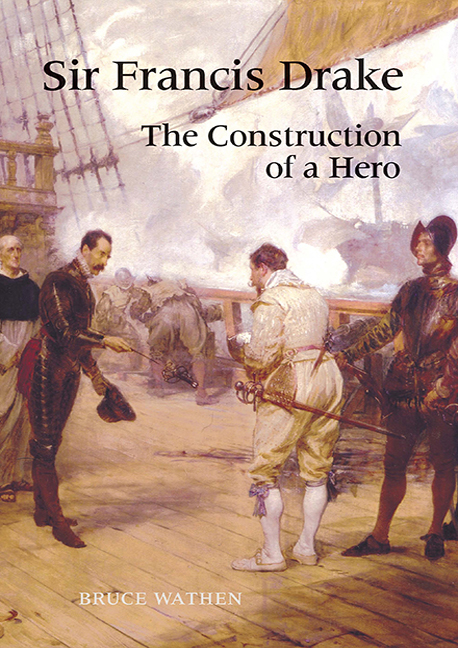Book contents
- Frontmatter
- Contents
- List of Illustrations
- Dedication
- Acknowledgements
- Introduction
- Chapter One Auxilio Divino
- Chapter Two ‘Sir Francis Drake Revived’
- Chapter Three ‘Behold the warrior dwindled to a beau’
- Chapter Four ‘Homage to Britannia’
- Chapter Five ‘Who the New World Bade British Thunders Shake?’
- Chapter Six ‘The Prose Epic of England’
- Chapter Seven ‘Mould him in bronze’
- Chapter Eight ‘Gun to Gun he'll Challenge us’
- Chapter Nine ‘A pirate, and a good one’
- Chapter Ten The Future
- Bibliography
- Index
Chapter Six - ‘The Prose Epic of England’
Published online by Cambridge University Press: 11 May 2017
- Frontmatter
- Contents
- List of Illustrations
- Dedication
- Acknowledgements
- Introduction
- Chapter One Auxilio Divino
- Chapter Two ‘Sir Francis Drake Revived’
- Chapter Three ‘Behold the warrior dwindled to a beau’
- Chapter Four ‘Homage to Britannia’
- Chapter Five ‘Who the New World Bade British Thunders Shake?’
- Chapter Six ‘The Prose Epic of England’
- Chapter Seven ‘Mould him in bronze’
- Chapter Eight ‘Gun to Gun he'll Challenge us’
- Chapter Nine ‘A pirate, and a good one’
- Chapter Ten The Future
- Bibliography
- Index
Summary
And the first thunder birth of these enormous forces and the flash of the earliest achievements of the new era roll and glitter through the forty years of the reign of Elizabeth with a grandeur which, when once its history is written, will be seen to be among the most sublime phenomena which the earth as yet has witnessed.
(James Anthony Froude, 1852)Reference has already been made to the nineteenth-century preoccupation with narratives of causation, with stories that sought to connect past and present through uninterrupted sequences of cause and effect eliding moments of historical disjunction. Charles Knight's Old England is clearly engaged in this process. For Knight the naval supremacy and empire that was enjoyed by Victorian Britain could be attributed to the activities of the Elizabethan sea-dogs – particularly Drake – who had wrested control of the high seas from Spain. But one historian did more than any other to shape the way in which the Elizabethan maritime past was perceived: James Anthony Froude. It was Froude who was principally responsible for popularizing the notion that the origins of the nation's naval power were located in the energies of the late sixteenth century.With its central theme that the Reformation brought about the freedom that allowed England to expand its commerce and colonies, his work changed the popular perception of sixteenth-century history. Put simply, Froude was concerned with mythologizing the imperial past – and Sir Francis Drake played a major part in this project.
Before looking at Froude's treatment of Drake, however, we must turn our attention to the two main determinants that shaped his writing of English history. The first significant influence on Froude was the religious thought of his elder brother, Richard Hurrell Froude and that of his fellow Oxford student, John Henry Newman. Hurrell Froude and Newman were principal members of the Oxford Movement, a body of churchmen and academics which aimed at reasserting the Catholicity of the Church of England. Together with John Keble and Edward Bouverie Pusey, the other leading figures in the Movement, they argued that the Church of England remained part of the holy Catholic Church (of which the Roman Catholic and Greek Orthodox Churches were also branches).
- Type
- Chapter
- Information
- Sir Francis DrakeThe Construction of a Hero, pp. 103 - 122Publisher: Boydell & BrewerPrint publication year: 2009

